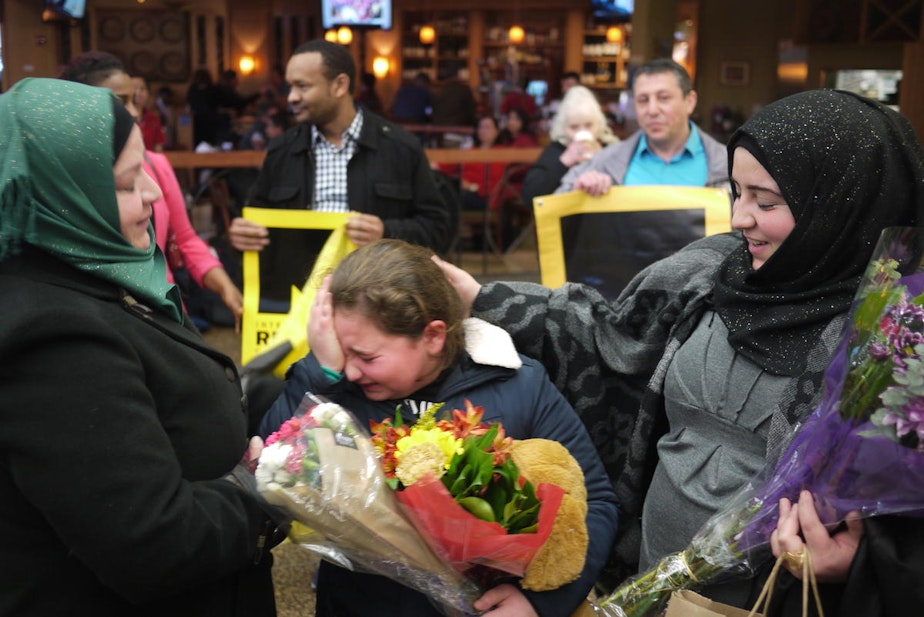Lawsuit: 'It's the dismantling of the U.S. refugee program'

After former U.S. Army Captain Allen Vaught was ambushed and hit with an IED in Iraq, a translator he’d hired traveled nearly 60 miles to make sure he was okay. The two men formed a close bond.
Since 2014, Vaught has tried to help the Iraqi translator resettle to the U.S. as a refugee.
An executive order from President Donald Trump, issued in late October, has put the Iraqi's resettlement case on hold indefinitely. The order places new restrictions on refugees from 11 mostly Muslim countries and indefinitely bans certain family reunification cases.
"That executive order is inconsistent with the American values I fought for as an officer in the United States Army,” Vaught said.
Vaught has now signed on as a plaintiff in a federal lawsuit filed Monday in U.S. District Court in Seattle, seeking a nationwide block against Trump’s order. For safety reasons, the translator Vaught hired in Fallujah, Iraq, is identified in the lawsuit with the pseudonym John Doe 1.
Sponsored
In court documents, Vaught, a former member of the Texas House of Representatives, said he loses sleep at night, wondering if the translator will be killed before he gets to the U.S. Two other translators Vaught worked with in Iraq have been murdered, according to the lawsuit.
“People are dying who were given permission to come into this country. It’s tragic,” said Rabbi Will Berkovitz, CEO of Jewish Family Service of Seattle, one of the refugee agencies that’s filed the lawsuit.
“The agenda that’s really thinly veiled here is the dismantlement of the refugee resettlement program as a whole,” Berkovitz said. “Not for now, but forever.”
The lawsuit claims the order is unconstitutional, discriminates against Muslims and gives preference to Christian refugees.
New security restrictions
Sponsored
An October 24 executive order from President Donald Trump outlined a new security vetting policy for refugees. As part of that policy, laid out in a Department of Homeland Security memo Oct. 23, the administration has delayed processing resettlement cases from 11 mostly Muslim countries for a three-month period. Most are countries in the Middle East and Africa.
The memo identified the 11 countries as “high risk” and said the government will conduct a 90-day review “to determine what additional safeguards, if any, are necessary to ensure ... the security and welfare of the United States.”
Refugee advocates point out a delay of someone's refugee case overseas could cause their previous security and medical clearances to expire, and postpone their case for years. Some may never make it back to the front of the line.
The executive order also indefinitely banned cases in which a refugee already in the U.S. applies for a spouse or children to join them here. About 2,500 family members apply to come to the U.S. every year, according to the DHS memo.
Families wait to reunite
Sponsored
One refugee caught in this limbo is an Iraqi father who came the U.S in 2014 and now lives in the Seattle area. Court documents show he fled his country due to persecution and death threats. He’s identified in the lawsuit as John Doe 7.
Once in the U.S., John Doe 7 got a visa approved to bring his teenage son here from Iraq.
But shifts in federal policy prevented the son’s travel.
Now that trip is also on hold, indefinitely.
Administration officials declined to comment on pending litigation, but officials have previously said stricter refugee vetting is necessary to keep the country safe.
Sponsored
According to an extensive 2016 study from Cato Institute, a libertarian think tank, no refugee resettled to the U.S. since the 1980 Refugee Act had committed a single fatal terrorist act against an American citizen.
“Of the 3,252,493 refugees admitted from 1975 to the end of 2015, 20 were terrorists, which amounted to 0.00062 percent of the total,” the study states.
Plaintiffs listed in the lawsuit live in various parts of the country, some are still refugees overseas, and some are U.S. citizens.
In the court filing, John Doe 7, the Iraqi father who’s trying to bring his son here, said he’s too scared to visit his son overseas because he’s afraid he will not be readmitted to the U.S.
He also has not bought a house in the U.S., according to the lawsuit, “because he is not sure that Muslims will be allowed to remain in the country.”

